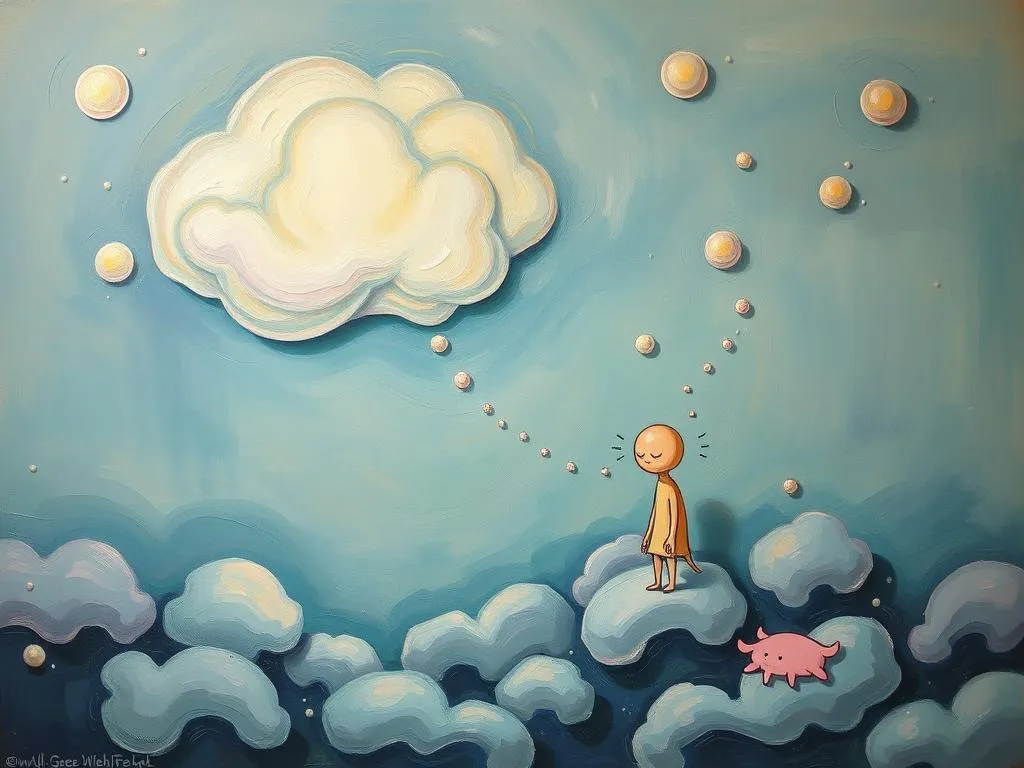
Have you ever woken up from a dream, drenched in a cold sweat, heart racing, and an unsettling feeling of guilt hanging over you? You’re not alone. Dreams that evoke guilt can feel overwhelmingly intense, leaving us questioning not just our subconscious thoughts but also our waking reality. These dreams often serve as a mirror, reflecting our inner conflicts, unresolved issues, or unexpressed emotions. But what do they really mean?
In this exploration, we’ll delve into the symbolism behind guilty feelings in dreams, examine personal experiences that manifest these emotions, and uncover pathways for personal growth. Let’s embark on this journey together, illuminating the shadows of your subconscious and shining a light on the insights that lie within.
Shadows of Conscience: Decoding the Symbols of Guilt
Dreams are rich tapestries woven from our thoughts, feelings, and experiences. When guilt appears, it often comes adorned with symbols that reveal the underlying causes of our emotions. Understanding these symbols can help us unpack the weight of guilt, bringing clarity and insight.
-
Falling: When you dream of falling, it can symbolize a fear of loss or failure. This could relate to a recent decision or action that you regret. The sensation of plummeting might echo feelings that you have let someone down or failed to meet expectations, amplifying your guilt.
-
Being Chased: If you find yourself running away from something or someone in your dreams, it often represents an avoidance of a specific issue in your life. The pursuer may symbolize the guilt that you are trying to escape. By confronting this figure, you can begin to face the feelings and issues you have pushed aside.
-
Inability to Speak: Dreaming that you cannot speak or express yourself can signify feelings of powerlessness or fear. Often, this manifests when you feel guilty about not standing up for someone or voicing your true feelings. This silence in dreams can reflect a deep-seated wish to reconcile what’s left unsaid in your waking life.
-
Drowning: Water is a powerful symbol in dreams, and drowning in guilt can represent being overwhelmed by emotions. This scenario often highlights feelings of regret, sorrow, or a sense of being trapped by your choices. It’s a call to acknowledge these overwhelming emotions rather than suppress them.
-
Judgment: If you dream of being judged—by a figure of authority or a familiar face—this can indicate self-criticism or external pressures you feel in your life. The judgment symbolizes your own harsh thoughts about your actions, amplifying the guilt you carry.
Recognizing these symbols can help you articulate your feelings of guilt. They serve as guides, pointing you toward areas of your life where you might need to seek forgiveness, make amends, or engage in self-reflection.
Dreamscapes of Regret: Scenarios of Guilt Unveiled
Now that we’ve explored the symbols surrounding guilt, let’s consider some common scenarios that might evoke these feelings in dreams. Each scenario provides a unique lens through which we can examine our emotions and behaviors in our waking lives.
-
Dreaming of Hurting Someone: Imagine a dream where you accidentally hurt a friend or loved one. You might wake up with a sense of dread, fearing that your subconscious is revealing your true feelings. This scenario often reflects a fear of conflict or a lingering regret about a harsh word or action taken in real life. It’s a prompt to reach out and reconcile any misunderstandings.
-
Failing an Exam: A dream where you fail an exam can evoke a profound sense of guilt, especially if you’ve been studying or preparing for something in your life. This scenario often symbolizes fear of inadequacy or not living up to your potential. It’s an opportunity to reflect on your self-expectations and embrace the notion that it’s okay to not always be perfect.
-
Stealing or Cheating: In this dream, you might find yourself stealing something insignificant or cheating in a game. This scenario often highlights feelings of inadequacy or fear of judgment from others. It suggests that you may be grappling with ethical dilemmas or the consequences of your choices—both in dreams and reality.
-
Being Late to an Important Event: Picture dreaming about being late to a wedding or an important meeting. The overwhelming sensation of guilt in this dream can signify your feelings about missed opportunities or letting others down. This dream nudges you to prioritize your commitments and consider how you manage time and responsibilities in your waking life.
-
Revisiting Past Mistakes: In this scenario, you might find yourself back in high school, facing the consequences of a mistake you made years ago. This dream often indicates unresolved guilt or the need to forgive yourself for past actions. It serves as a reminder that growth comes from learning from our mistakes rather than being trapped by them.
Each of these scenarios can evoke a strong emotional response, urging you to reflect on your actions and feelings. They can serve as a catalyst for change, encouraging you to confront unresolved issues and ultimately leading you toward healing and understanding.
The Alchemy of Guilt: Transforming Shadows into Growth
While guilt can feel heavy and burdensome, it can also be a powerful catalyst for personal growth. Embracing guilt as a teacher rather than a tormentor can help you navigate your emotional landscape with greater ease and understanding. Here are some steps to transform guilt into a tool for self-improvement:
-
Acknowledge Your Feelings: The first step is to embrace your feelings of guilt without judgment. Recognize that guilt is a natural response to certain actions or thoughts. Allow yourself to feel it fully, understanding that it’s a part of being human.
-
Reflect and Assess: Take time to reflect on the source of your guilt. What actions or events have triggered these feelings? Assess whether these feelings stem from something that warrants genuine remorse or if they are rooted in perfectionism or fear of judgment.
-
Seek Forgiveness: If your guilt is tied to a particular person, consider reaching out to them. Apologizing and seeking forgiveness can be a powerful way to release the emotional burden you carry. Remember, it’s okay to make mistakes; what matters is how you choose to address them.
-
Learn and Grow: Use guilt as a springboard for personal development. What lessons can you draw from this experience? How can you ensure that you don’t repeat the same mistakes? Embrace the idea that growth often comes from discomfort.
-
Practice Self-Compassion: Lastly, be gentle with yourself. Everyone makes mistakes; it’s part of the human experience. Practicing self-compassion can help alleviate the weight of guilt, allowing you to move forward with greater clarity and purpose.
By transforming guilt into an opportunity for growth, you can reclaim your power and use your experiences to foster deeper self-awareness and understanding.
As we conclude this exploration of guilt in dreams, remember that these feelings, while uncomfortable, hold valuable insights into your emotional landscape. They are not mere disturbances but invitations for reflection and growth. Allow yourself the grace to navigate these feelings with kindness and curiosity.
What lessons might your dreams be trying to teach you? Reflect on this, and you may uncover a treasure trove of insights that will guide you on your journey toward a more authentic and fulfilling life.







